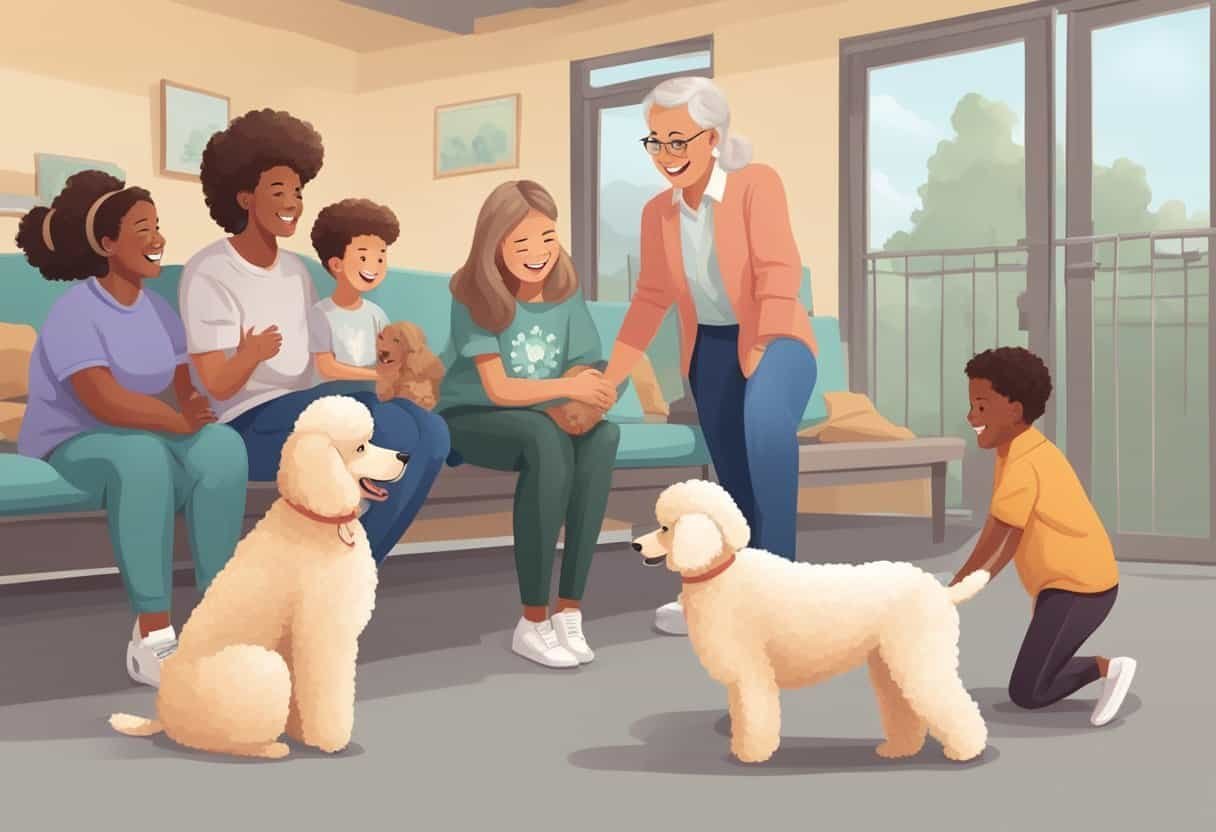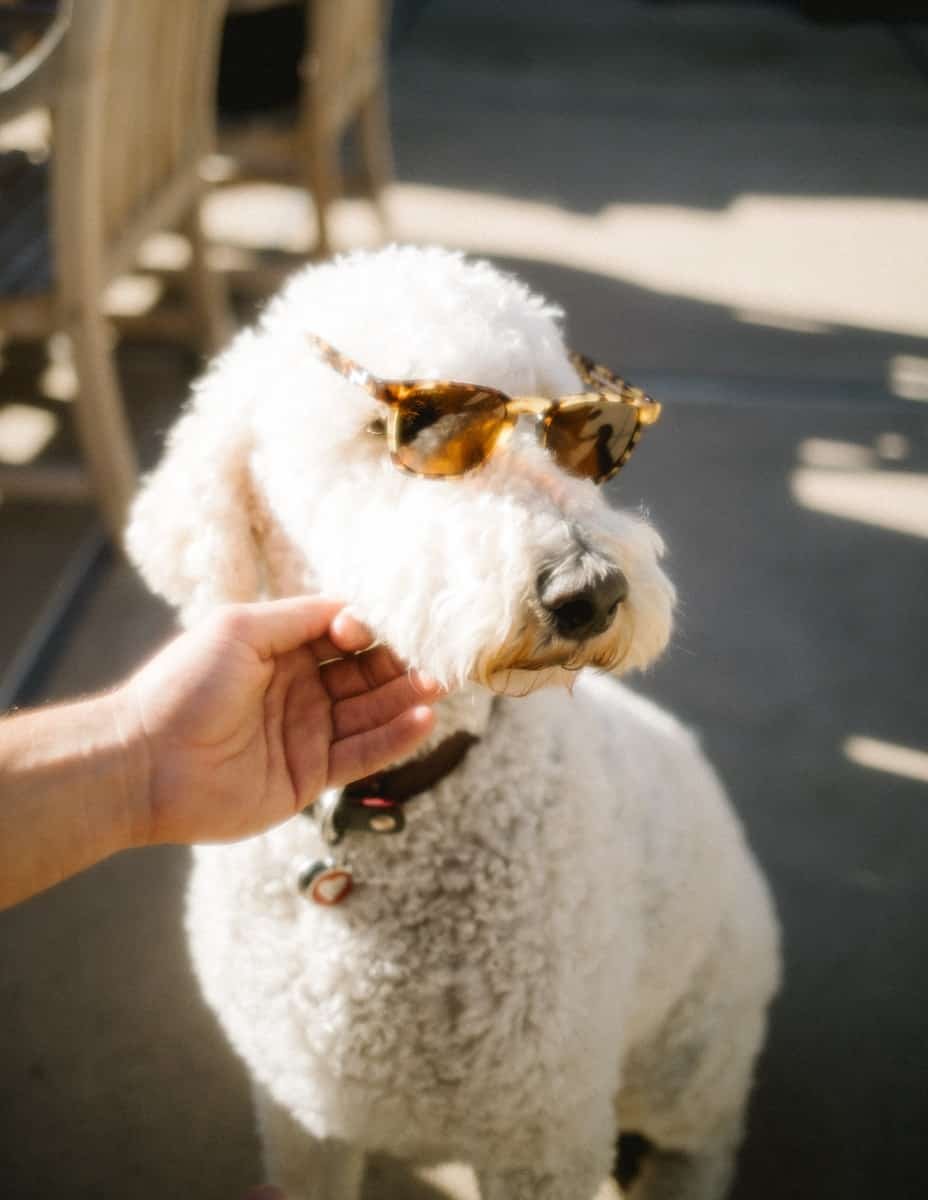As a senior poodle owner, you want to ensure that your furry companion is happy, healthy, and comfortable in their golden years. However, caring for senior dogs can be challenging, especially if you don’t have the right resources and support. Fortunately, there are many resources available to help you care for your senior poodle, from veterinary care to nutrition and exercise advice, grooming tips, and more.
Understanding the unique needs of senior poodles is crucial to providing them with the best possible care. As your poodle ages, they may become more susceptible to health challenges, including joint problems, dental issues, and cognitive decline. Regular veterinary care is essential to monitoring and treating these issues, but you can also take steps to prevent them by providing a healthy diet, regular exercise, and mental stimulation.
Whether you’re a new or experienced senior poodle owner, there’s always more to learn about caring for your furry friend. With the right resources and support, you can help your poodle live a happy and comfortable life in their golden years. In this article, we’ll explore some of the best resources and support available for senior poodle owners, from expert advice to community groups and more.
Key Takeaways
- Understanding the unique needs of senior poodles is crucial to providing them with the best possible care.
- Regular veterinary care, a healthy diet, regular exercise, and mental stimulation are essential to preventing and treating health issues in senior poodles.
- With the right resources and support, you can help your senior poodle live a happy and comfortable life in their golden years.
Understanding Senior Poodles
As your poodle enters their golden years, it’s important to understand the changes that come with aging. Senior poodles are generally considered to be those over the age of 7, and as they age, they may experience a variety of physical and behavioral changes.
One of the most noticeable changes in senior poodles is a decline in energy levels. They may become less active and require more rest than they did in their younger years. Along with this, they may experience weight gain, so it’s important to monitor their diet and exercise routine to keep them at a healthy weight.
Senior poodles may also experience joint pain and arthritis, which can impact their mobility. Regular exercise, such as short walks or gentle playtime, can help keep their joints limber and reduce pain. In some cases, supplements containing glucosamine and chondroitin may also be helpful in supporting joint health.
As your poodle ages, they may also experience vision and hearing loss. This can lead to confusion and disorientation, so it’s important to keep their environment consistent and predictable. You may also need to adjust your communication style to accommodate their changing abilities.
Finally, it’s important to remember that senior poodles have unique care requirements. Regular visits to the vet can help catch and treat any health issues early on, and a diet tailored to their age and size can help keep them healthy and happy in their golden years. With the right care and attention, your senior poodle can continue to enjoy a happy and fulfilling life.
Health Challenges and Veterinary Care
As your poodle ages, they may face a variety of health challenges that require veterinary care. Knowing what to expect and how to manage these issues can help you ensure that your senior poodle remains healthy and happy for years to come.
Common Health Issues
Some common health issues that senior poodles may experience include stiffness, incontinence, ear infections, mobility issues, and joint pain. These issues can be caused by a variety of factors, including arthritis, hip dysplasia, and other age-related conditions.
It is important to be aware of the signs of these health issues so that you can seek veterinary care as soon as possible. Your veterinarian can help you manage these issues through a combination of medication, exercise, and other treatments.
Importance of Regular Vet Visits
Regular veterinary visits are crucial for maintaining your senior poodle’s health. During these visits, your veterinarian can perform a thorough physical exam, assess your poodle’s overall health, and recommend any necessary treatments or medications.
In addition to regular check-ups, it is important to seek veterinary care as soon as you notice any signs of illness or discomfort in your senior poodle. Early intervention can help prevent more serious health issues from developing.
Medications and Vaccinations
As your poodle ages, they may require medications or vaccinations to help manage their health. Your veterinarian can recommend the appropriate medications and vaccinations based on your poodle’s individual needs.
It is important to follow your veterinarian’s instructions closely when administering medications or vaccinations to your senior poodle. Failure to do so can result in serious health complications.
In conclusion, senior poodles may face a variety of health challenges as they age. Regular veterinary care, including check-ups, early intervention, and appropriate medications and vaccinations, can help ensure that your senior poodle remains healthy and happy for years to come.
Nutrition and Exercise for Senior Poodles
As your poodle ages, their nutritional needs and exercise habits may change. It’s important to provide your senior poodle with the proper nutrition and exercise to maintain their health and well-being. In this section, we’ll cover the nutritional needs and exercise habits of senior poodles.
Nutritional Needs
Senior poodles require a different diet than their younger counterparts. As your poodle ages, their metabolism slows down, and they may become less active. This means they require fewer calories and a different balance of nutrients.
When choosing a senior dog food for your poodle, look for one that is high in protein and low in fat. Senior dog foods often contain added supplements such as glucosamine and chondroitin, which can help support joint health. It’s important to consult with your veterinarian before making any dietary changes.
In addition to their regular meals, you may also want to consider giving your senior poodle treats that are specifically designed for their age group. Look for treats that are low in calories and high in nutrients, such as dental chews or rawhide alternatives.
Exercise and Mobility
As your poodle ages, they may become less active and have difficulty with mobility. It’s important to provide them with exercise that is appropriate for their age and physical ability.
Low-impact exercise such as short walks or swimming can help keep your senior poodle active and maintain their mobility. It’s important to consult with your veterinarian before starting any new exercise regimen.
In addition to exercise, you may also want to consider providing your senior poodle with supplements that can help support joint health and mobility. Glucosamine and chondroitin supplements can help support joint health, while omega-3 fatty acid supplements can help reduce inflammation.
Overall, providing your senior poodle with the proper nutrition and exercise is essential for maintaining their health and well-being. Consult with your veterinarian to determine the best diet and exercise plan for your senior poodle.
Grooming and Comfort for Senior Poodles
As your poodle ages, their grooming and comfort needs may change. It’s important to adapt to these changes to ensure they remain healthy and happy. Here are some tips to help you groom and create a comfortable environment for your senior poodle.
Grooming Tips
Senior poodles may have different grooming needs than younger poodles. They may have a harder time standing for long periods of time, so it’s important to keep grooming sessions short and comfortable. Use a non-slip mat to prevent slipping and sliding during grooming.
Brush your poodle’s coat regularly to prevent matting and tangling. Use a slicker brush to remove loose hair and a comb to get rid of any tangles. If your poodle has arthritis or joint pain, consider using a grooming table that can be adjusted to their height. This will make grooming easier for both you and your poodle.
Keep your poodle’s nails trimmed to prevent them from getting too long and causing discomfort. If you’re not comfortable trimming your poodle’s nails, take them to a professional groomer or veterinarian.
Creating a Comfortable Environment
Senior poodles may develop joint pain or arthritis, making it difficult for them to get comfortable. Providing a comfortable environment can help ease their discomfort. Consider investing in a dog bed that provides support for their joints, such as an orthopedic bed. These beds can help alleviate pressure on your poodle’s joints and provide a comfortable place for them to rest.
Make sure your poodle’s bed is located in a warm, quiet area of your home. This will help them relax and get the rest they need. If your poodle has trouble getting up and down from their bed, consider placing a ramp or steps next to their bed to help them get in and out more easily.
In conclusion, grooming and comfort are important factors to consider when caring for your senior poodle. By following these tips, you can help ensure that your poodle remains healthy and happy in their golden years.
Adopting and Caring for Senior Poodles
As a senior poodle owner, you know the joys of having a loyal and loving companion. However, caring for an aging dog can come with its own set of challenges. This section will cover some important considerations when adopting and caring for senior poodles.
Adoption Process
Adopting a senior poodle can be a rewarding experience for both you and the dog. Many shelters and rescue organizations have senior poodles available for adoption. The adoption process typically involves filling out an application, meeting the dog, and paying an adoption fee. Some shelters may require a home visit to ensure that your home is a safe and suitable environment for the dog.
Cost of Care
Caring for a senior poodle can be more expensive than caring for a younger dog. Senior poodles may require more frequent visits to the vet and may need special diets or supplements. It’s important to factor in these additional costs when considering adopting a senior poodle. However, adopting a senior poodle from a shelter or rescue organization can often be more affordable than purchasing a puppy from a breeder.
Special Needs and Considerations
Senior poodles may have special needs and considerations that you should be aware of. For example, they may require more frequent potty breaks and may have difficulty climbing stairs or getting in and out of cars. Senior poodles may also be more prone to health issues such as arthritis, dental problems, and vision and hearing loss. It’s important to be aware of these potential issues and to provide your senior poodle with the care and attention they need.
If you are considering adopting a senior poodle with special needs, you may want to look into a sanctuary for senior dogs. These organizations provide a safe and loving environment for senior dogs that may have difficulty finding a forever home due to their age or health issues. Some sanctuaries may also be in need of volunteers or donations to help care for their residents.
In conclusion, adopting and caring for a senior poodle can be a fulfilling and rewarding experience. By being aware of the adoption process, cost of care, and special needs and considerations, you can provide your senior poodle with the love and care they deserve.
The Role of Love and Mental Stimulation
As a senior poodle owner, providing your furry friend with love and mental stimulation is crucial for their overall well-being. Love is the foundation of any healthy relationship, and it is no different when it comes to your senior poodle. Showering your pet with love, attention, and affection can help reduce anxiety and stress, and it can also improve their mood and behavior.
Mental stimulation is equally important, as it can help keep your senior poodle’s mind sharp and active. As dogs age, their cognitive abilities can decline, leading to memory loss and decreased learning ability. However, providing your senior poodle with mental stimulation can help slow down this decline and improve their cognitive function.
There are several ways to provide mental stimulation for your senior poodle. One effective method is through trick training, which can help reduce excessive cortisol and increase feel-good hormones like oxytocin. Other mental stimulation exercises include obedience training, puzzle toys, and interactive games.
In addition to mental stimulation, physical exercise is also important for your senior poodle’s overall health. However, it is important to tailor exercise routines to your poodle’s age and physical abilities. As poodles age, they may experience joint pain or other health conditions that can limit their mobility. In such cases, low-impact exercises like swimming or short walks may be more appropriate.
In conclusion, providing your senior poodle with love and mental stimulation is essential for their overall well-being. By showering them with affection and engaging them in mental stimulation exercises, you can help keep their mind sharp and active, reduce anxiety and stress, and improve their mood and behavior.
Sleep and Routine for Senior Poodles
As your poodle ages, their sleep and routine needs may change. It’s important to pay attention to their behavior and adjust their routine accordingly. Here are some tips to help your senior poodle get the rest they need and maintain a healthy routine:
Sleep
Senior poodles may sleep more than younger dogs, but excessive sleep can also be a sign of health issues. It’s important to monitor your dog’s sleep habits and consult with a veterinarian if you notice any changes. Here are some tips to help your senior poodle get the best sleep possible:
- Provide a comfortable bed: A comfortable bed can help ease joint and muscle issues that senior poodles may experience. Consider a bed with memory foam or orthopedic support.
- Create a quiet environment: Senior poodles may be more sensitive to noise and disruptions. Consider creating a quiet and calm environment for them to sleep in.
- Stick to a routine: Maintaining a consistent sleep schedule can help your senior poodle get the rest they need. Try to stick to a regular bedtime and wake-up time.
Routine
Senior poodles may require adjustments to their routine to accommodate changes in their health and behavior. Here are some tips to help maintain a healthy routine for your senior poodle:
- Adjust meal times: Senior poodles may require smaller and more frequent meals to maintain a healthy weight and avoid digestive issues.
- Provide regular exercise: Exercise is important for maintaining mobility and overall health in senior poodles. However, it’s important to adjust the intensity and duration of exercise to accommodate their age and health.
- Schedule regular vet check-ups: Regular check-ups can help catch and address health issues before they become serious. Consult with your veterinarian on the appropriate frequency of check-ups for your senior poodle.
By paying attention to your senior poodle’s sleep and routine needs, you can help them maintain a healthy and happy life.
Frequently Asked Questions
As a senior poodle owner, you may have questions about caring for your furry friend. Here are some frequently asked questions to help guide you:
What are some free pet loss support groups for seniors?
Losing a pet can be a difficult and emotional experience, especially for seniors who may have formed a strong bond with their poodle. Fortunately, there are many free pet loss support groups available for seniors. One such group is the Association for Pet Loss and Bereavement, which offers online support groups and resources for seniors who have lost a pet.
What is the Pets for Seniors program and how can it help me?
The Pets for Seniors program is a non-profit organization that helps seniors adopt pets. This program can help seniors find a furry companion that fits their lifestyle and needs. The program also offers resources and support for seniors who need help caring for their pets.
What are some ways to care for a senior poodle?
As your poodle ages, their needs may change. Here are some ways to care for your senior poodle:
- Provide a healthy diet that is appropriate for their age and health condition.
- Make sure they get regular exercise, but adjust the intensity and duration to match their abilities.
- Schedule regular check-ups with the veterinarian to monitor their health and catch any issues early.
- Provide a comfortable and safe living environment that is free from hazards and obstacles.
- Give them plenty of love, attention, and mental stimulation to keep them happy and engaged.
What is the best large dog breed for seniors?
The best large dog breed for seniors depends on your individual needs and lifestyle. However, some breeds that are known for being good with seniors include the standard poodle, labrador retriever, and golden retriever.
At what age is a poodle considered a senior?
According to veterinary guidelines and canine experts, a poodle generally enters their senior years around the age of 7. This transition to senior status may come with noticeable changes in energy levels, mobility, and overall health, making it crucial for owners to adapt their care routines accordingly.
Is it a good idea for a 70 year old to get a dog?
Getting a dog at any age can be a rewarding experience, but it’s important to consider your lifestyle and ability to care for a pet. If you are a 70 year old considering getting a dog, it’s important to choose a breed and size that fits your needs and abilities. You may also want to consider adopting an older dog that may be more suitable for your lifestyle.



